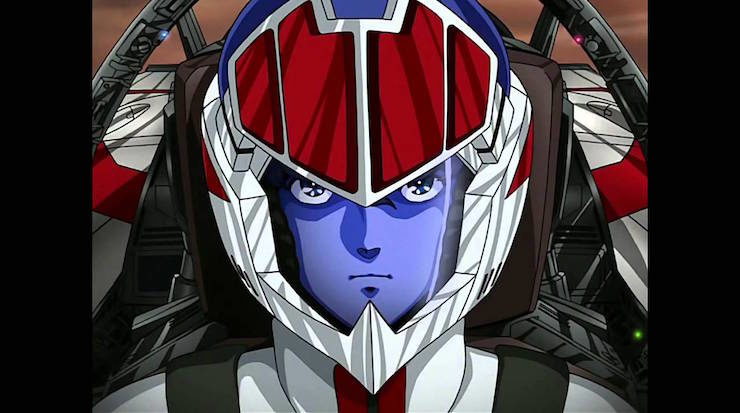It was so far ahead of its time that merely watching it now makes you wonder how the heck it actually got on TV.
Before the rebooted Battlestar Galactica. Before Star Wars: The Clone Wars or Voltron: Legendary Defender, before The Expanse, there was one space opera show that was ambitious and groundbreaking in scope, both because of source material and out of necessity (more on that later). There were major character deaths, romance, a massive cast, deep world building, a serialized plot that forced the viewer to pay attention, lead characters that played with gender dynamics, interracial romance, and unflinching violence that showed the horrors of war.
Somehow, that all wound up being sold into 1985 afterschool TV as a kid’s cartoon. That show, whose legacy stands today, was Robotech.
A multi-generational sci-fi epic, Robotech was unlike anything American audiences had seen. Stitched together from three completely separate anime series by screenwriter Carl Macek, the show was completely rewritten but not dumbed down for the afterschool crowd; in fact, the final version is more complex than the source material. By evolving the core series into an interwoven narrative, Robotech’s story offers greater world building, stronger character depth, and more compelling reasons for various protagonists and antagonists to pursue the macguffin of protoculture, an energy source that can power space-warp travel, genetic engineering, and transformational technology.
In today’s TV world, this type of complexity and drama is welcomed. There’s a reason why Dave Filoni (Star Wars: The Clone Wars, Star Wars: Rebels) isn’t shy about the influence of Robotech on his work. But while Robotech maintains a cult following, these days it seems like more people know of it than have actually seen it. And with good reason too, given that the property’s core screen material has remained relatively stagnant since its original run. Outside of a few failed continuation attempts, further story remains outside firmly the property of comics and novels—in fact, Titan Comics has its own reboot series with its own modernized continuity.
The dearth of new material is a situation as unique as the shows origins, from an ongoing legal battle embroiling franchise owner Harmony Gold over the Macross license to the perpetual development hell of a live-action movie to a seemingly cursed string of attempted sequels. “I think for as valiant an attempt as it is for Harmony Gold to keep trying to make Robotech: Shadow Rising a thing, it really needs to give up and focus their attention on a reboot. That’s where the money is and that’s where a whole new fanbase can be found,” says Den of Geek’s Shamus Kelley. Kelley should know—he co-hosts the Roboskull podcast, which reviews each Robotech episode from both a fan (Kelley) and a newbie (podcaster Nick Cochran) perspective. “Trying to appeal to a very small set of hardcore fans isn’t going to pay off in the long run.”
Harmony Gold President of Animation Tommy Yune doesn’t think a reboot is out of the question, but won’t put a timeline on it. “My opinion is that (a reboot) is inevitable. Robotech is one of those franchises where it’s grown and lasted so long that it’s going to be retold again and again,” he told Den of Geek in late 2016. “Fans will want to hold onto their original continuity and that will be great. That’ll be there for them. But a whole new generation of fans will be able to enjoy Robotech in a new way.”
Beyond pure finances, the appetite for reboots seems to have only grown since Yune’s comment. Simply put, they’re all over TV, and while some fall flat on their face, others like Voltron: Legendary Defender are wildly successful from both a creative and viewership perspective. Harmony Gold may be uncertain about such a thing, but given the current state of sci-fi, animation, and legacy geekdom, the time is right for a Robotech reboot.
Robotech Fits Perfectly with Modern Storytelling Styles
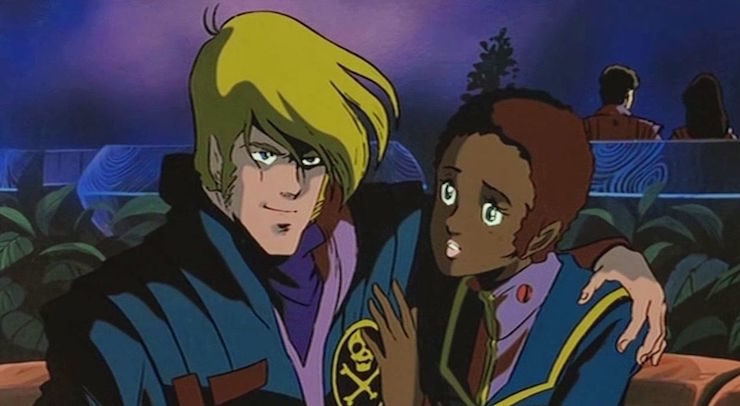
Perhaps it’s ironic properties like Voltron and Thundercats are getting reboots that ditch the episodic monster-of-the-day lighter fare to add backstory, world, and a more mature tone. Their contemporary Robotech had them all along. “Robotech was already at a modern level of storytelling back in the ’80s. Robotech set a blueprint for the kinds of high-quality animated series we’re all enjoying now,” says Kelley. But the complexity of Robotech is multifaceted—not just in its overarching plot, but in its character relationships and the way they grew and evolved. “Even thirty years later these characters feel like real people. They all have moments that are so incredibly human, even against the backdrop of an alien war. The animation may not be what viewers expect today but the characters emotions? Those are timeless.”
With nostalgia reboots at an all time high, Robotech makes sense from another perspective: fandom. While the show enjoyed a cult following since its launch in 1985, it hasn’t experienced anything like the rabid nature of modern fandom. And yet, the show’s core principles of character, story, and cool designs make the perfect combination for modern fan culture. “These days the things hardcore fans gravitate towards the most are the characters,” says Kelley. “It’s not just because people love to dress up (although that’s a big part of it) but it’s because they love the characters they’re cosplaying as. An emphasis on character is essential in modern storytelling if you want to connect with your audience.
A New Series Could Fix the Structural Problems of the Original
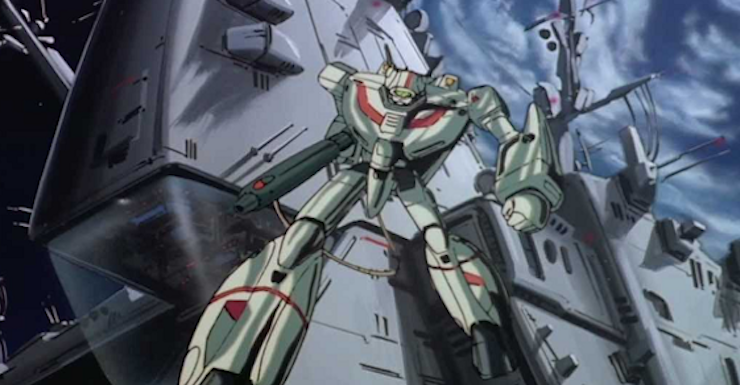
The fact that Robotech exists and works as well as it does is impressive in itself. On the other hand, the producers relied on a bit of a cheat to band-aid cracks in the storytelling together: a narrator. “Adaptation is an underappreciated art form, especially when it comes to anime, but it does take a lot of control out of the writers’ hands and no amount of creativity can fix every issue,” says Kelley. “You end up having to band-aid over a lot of it either with voice over or a ton of info dumps, which Robotech is very guilty of.”
The Robotech narrator was used for all sorts of info dumping, not just setting the scene. This was critical from a storytelling perspective as footage was recontextualized to serve a much bigger purpose. In the Macross Saga (the first series), it’s used to some degree but rarely becomes as invasive as in the Masters Saga. As the middle act of Robotech, the Masters had to do massive amounts of legwork to connect what came before and what came after. Achieving that often created square-peg syndrome, and the result created some scenes that nearly collapsed under the weight of its own expository technobabble.
“At times it is a bit much, but I feel over all that without the narrator the show would not even work,” says Cochran, the newbie half of RoboSkull’s team. “You have to have an overall plot that is wholly original somehow work with only an omnipresent voice telling you that ‘no, this works, I swear’ to tie it all together, otherwise it would probably fall apart.”
A reboot, then, allows this narrative to properly breathe without the constraints of the source footage. Not only that, but with the benefit of hindsight and time, the tiniest of world elements could be expanded upon to create a more cohesive and unified whole.
30+ Years Later, the Core Story Holds Up
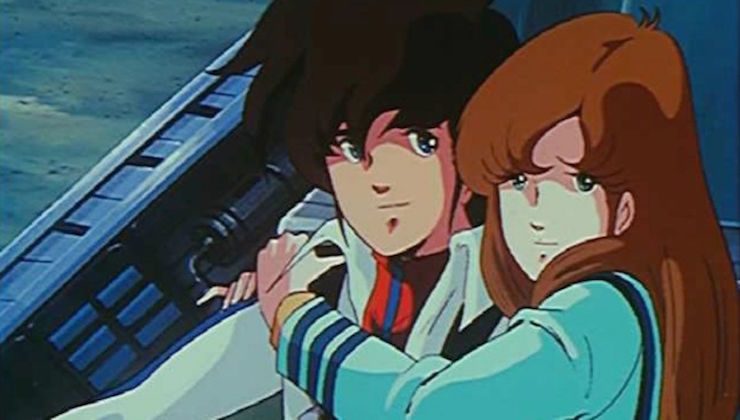
Even the team behind Voltron’s reboot acknowledged the relatively thin depth behind the original. It was up to them to take the core concept, find what really withstood the test of time, and pull that into the modern era. With Robotech, that problem doesn’t exist. The show, despite its production hiccups and sometimes dated elements, still holds up. The biggest testimony to this lies in the RoboSkull podcast and the fact that one half of the team is watching the series completely cold (and avoiding spoilers for the long haul). Cochran’s reactions and feelings simply aren’t tinted by nostalgia, yet he considers himself a fan now, warts and all. It’s a testament to the writing and world-building done by Macek and his team.
“The quality of the writing is something I do enjoy, all the characters feel real and like they exist, exploding off the screen and into my heart and imagination,” says Cochran. “The show is about the characters and the journey, the love stories and the friendships. When a show treats itself with respect, and the kids watching it with respect, then people will respect it. People will love it.”
Kelley, RoboSkull’s veteran fan, agreed. “I think if modern audiences who enjoy series like Voltron: Legendary Defender or Star Wars: Rebels gave it a chance? They’d find a lot to love. Even thirty years later these characters feel like real people. The animation may not be what viewers expect today but the characters emotions? Those are timeless.”
Reboot or Relaunch? Or Both?
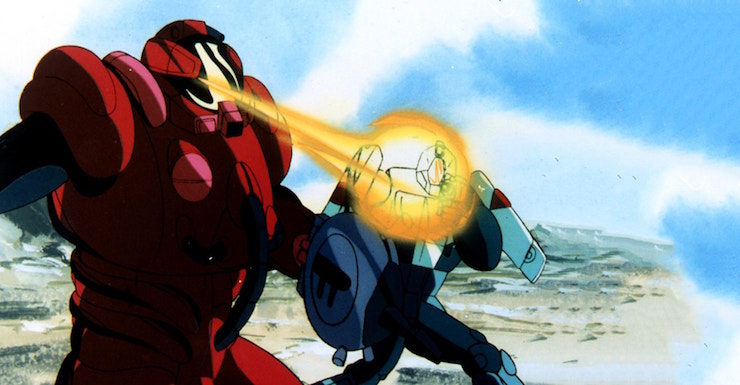
Given all that, why hasn’t a studio picked up Robotech for a Voltron-esque reboot? The answer lies less in the ashes of failed sequels and more in the legal red tape tying up the Macross license. As most people associate Robotech with its first series, the battle over Macross would render the franchise without its most popular component. (Characters and designs for the other segments were used for new footage in various projects such as the aborted Robotech II: The Sentinels project without any legal issues.) The result would either be a reboot that would radically altered the first segment as a means of distancing itself or omitting it to background exposition.
The former is most likely the basis of the development-hell live action movie. The latter would be franchise suicide.
Or would it? Kelley thinks otherwise. In fact, he sees rebooting the Masters Saga as a way to both course-correct continuity issues and introduce it to a modern audience. “I’ve proposed,” Kelley says, “because of the legal quagmire around the Macross rights, that you could actually keep the Macross saga as is but start the reboot from Masters.”
This idea, first described during episode 30 of the RoboSkull podcast, achieves both a continuation and modern reboot in one project, and in many cases, it creates the best of both worlds: it acts simultaneously as a generational continuation of the original Macross story like Star Trek: The Next Generation or Blade Runner 2049 while also being a reboot with the flexibility of modern storytelling like Ronald D. Moore’s Battlestar Galactica.
For viewers who had only heard of the franchise, they could come in cold or familiarize themselves with Macross through the original animation (easily available on Netflix and Amazon). For fans who’ve casually known the show but only really associated it with Macross, this would provide a new experience while still tying into the old continuity, all with familiar characters. For die-hard fans, it would be a bit of a reward for their patience, as Robotech’s middle child suffered the most from adaptation and original plot problems due to its truncated Japanese production.
Buy the Book
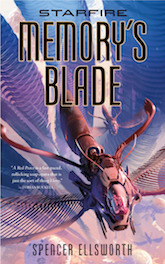

Starfire: Memory’s Blade
Such a series would also leave the next step wide open. Continue the modern reboot by redoing the New Generation chapter? Pick up the aborted Shadow Rising project? Follow the Masters’ protagonist Dana Sterling on her post-series adventures (completely undocumented in the franchise’s primary canon and only touched upon briefly in deep-canon comics)? Or do something completely new?
Of course, the first step is to actually have anything new hit screens in the near future. Considering the only new completed projects the franchise has seen since 1985 were the mildly successful Shadow Chronicles and the glorified clip show Love Live Alive, the fact that people are still talking about Robotech is somewhat remarkable. But that’s even more of a testament to the universe Carl Macek built in the face of 1980s TV syndication requirements. Perhaps Macross Saga hero Roy Fokker probably put it best: “This Robotech stuff, it just gets in your blood or something.”
For a generation of fans, that remains true. For those that discovered the groundbreaking series through DVDs and streaming services, that also remains true. Now it’s up to Harmony Gold to actually take the next step and give Robotech the reboot it badly deserves.
 Mike Chen has covered geek and pop culture for a number of popular outlets, including The Mary Sue and The Portalist. A former national sportswriter, his debut time-travel novel Here and Now and Then releases in early 2019 from MIRA Books. Visit his website or follow him on Twitter for geekery discussion, Doctor Who gifs, and many curse words.
Mike Chen has covered geek and pop culture for a number of popular outlets, including The Mary Sue and The Portalist. A former national sportswriter, his debut time-travel novel Here and Now and Then releases in early 2019 from MIRA Books. Visit his website or follow him on Twitter for geekery discussion, Doctor Who gifs, and many curse words.










